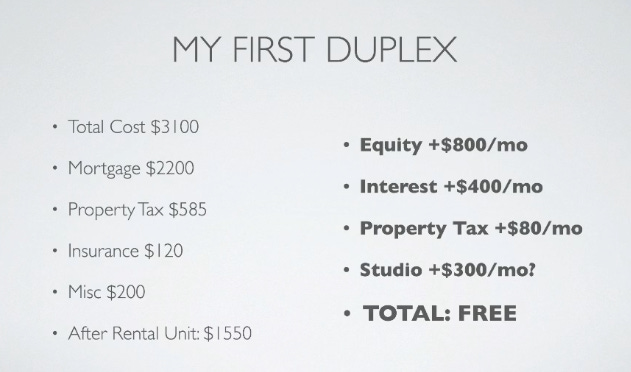House Hacking 101
Live, own, and earn
Welcome to Graham’s newsletter! Last week, I did my first-ever Webinar for readers, and I really enjoyed it. The topic of the webinar was “House Hacking”. It’s a topic that I think is really useful and relevant to the current times. Subscribe and read on to learn more and get access to the entire call recording, complete with Q&A and extra insights:
Real estate is simultaneously an exciting and disappointing possibility for many people. There are few investments that have consistently appreciated over the long term like real estate has while also dispensing with a lot of problems that traditional investments come with –
Do you panic and sell? Real estate has low liquidity, so you can’t sell impulsively.
Do you try to time the market? In the short term, timing the real estate market doesn’t give you any advantage.
Do you struggle with investing in a disciplined manner? Real estate enforces monthly mortgage payments, which forces you to get into financial shape.
But there’s one thing that’s a dealbreaker – There’s a high barrier to entry. You need to save for a down payment, and then a chunk of your income will go towards mortgages every month. That’s a huge commitment, especially in a market like this, with high-interest rates. My three-part series on “How to save for a home” tackles this problem by diving into all aspects. But there is another approach.
If buying a house and renting are two extremes, house hacking is the middle ground that can help you get the best of both worlds. While you’re technically paying a mortgage, you also recoup your investment in real-time and have much more cash to spare. In one way, it’s as if somebody else pays for the house you end up owning. But house hacking has its own pros, cons, and risks. In this deep dive, I’ll detail my own experience with house hacking and tell you everything you need to know to get started with it.
What is house hacking?
House hacking is nothing but renting out a portion of the house you live in it. By collecting rent from your tenant, you can reduce your cost of living or even turn a profit. In the long run, you end up owning the property by paying virtually nothing for it. There are a few basic steps involved in house hacking:
Save up a down payment – There’s no getting around this part. It took me around ten years to save for a down payment on a house, and it was possible only by living below my means and saving systematically.
Buy a multi-family property – For a comfortable experience, you need to separate your living quarters from your tenant’s. I got started with a duplex.
Move in and rent out the other units.
Live rent-free!
Alright, but point 2 is where you need to be careful. Not every property on the market is a right fit for house hacking. 95% of properties on the market don’t make sense, especially with interest rates the way they are. In this sort of climate, renting is the logical option – For example, in Los Angeles, a house that costs $1.2 Million could be renting for as low as $4,000. Be very intentional about what you buy and be patient. It took me 6 months to find my first deal where the numbers made sense – don’t rush it!
My first duplex
Most properties are not going to work, but house hacking is about finding the needle in the haystack. Is it difficult? Yes. Is it worth it? Yes, but you need to work hard to make it worth your time. We’ll be jumping into the pros and cons of rent hacking later, but first, let’s take a look at just the numbers behind the house I bought:
The thing about mortgages is that the mortgage is just the base of your pizza – the toppings keep getting added on top of that. The miscellaneous stuff is what’s really hard to account for, be it roof leaks, the drip line in the front, etc. When I made this deal, I rented it out for a lower price than market value and it took some time before I started breaking even. Later, the same property would bring in much more in rent, but in the beginning, it seemed like I was barely scraping by.
But on the plus side, I was gaining $800 a month on equity. I was also able to get a $80 tax write-off (in California). Depending on where you live and your financials, you might be able to get a good deal here. I turned my garage (about 1/4th of the total square footage) into my office – I was able to get some tax benefits by clearly separating my work and residential space as well.
At the end of it all, I got a good start, by being able to live completely free. But what was I missing?
Read on to know about the pros and cons, how to screen tenants, rent-hacking, and more. Premium subscribers also get access to the video webinar which includes Q&A!


